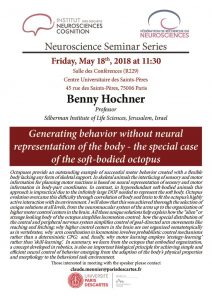 Title: Generating behavior without neural
Title: Generating behavior without neural
representation of the body – the special case
of the soft-bodied octopus
Benny Hochner Professor Silberman Institute of Life Sciences, Jerusalem, Israel
Neuroscience Seminar Series:
Friday, May 18th, 2018, 11:30 am, Salle des conférences (3rd Floor), Centre Universitaire des Saints-Pères, 45 rue des Saints-Pères, 75006 Paris
Abstract: Octopuses provide an outstanding example of successful motor behavior created with a flexible body lacking any form of skeletal support. In skeletal animals the interfacing of sensory and motor information for planning motor reactions is based on neural representation of sensory and motor information in body-part coordinates. In contrast, in hyperedundant soft-bodied animals this approach is impractical due to the infinitely large DOF needed to represent the soft body. Octopus evolution overcame this difficulty through coevolution of body and brain to fit the octopus’s highly active interaction with its environment. I will show that this was achieved thorough the selection of unique solutions at all levels, from the neuromuscular system of the arms up to the organization of higher motor control centers in the brain. All these unique solutions help explain how the “alien” or strange looking body of the octopus simplifies locomotion control; how the special distribution of the central and peripheral nervous system simplifies control of goal-directed arm movements like reaching and fetching; why higher control centers in the brain are not organized somatotopically as in vertebrates; why arm coordination in locomotion involves probabilistic control mechanisms rather than a deterministic CPG; and, finally, why motor learning employs ‘strategy-learning’ rather than ‘skill-learning’. In summary, we learn from the octopus that embodied organization, a concept developed in robotics, is also an important biological principle for achieving simple and efficient neural control of behavior emerging from the adaption of the body’s physical properties and morphology to the behavioral task environment.
Those interested in meeting with the speaker please contact
claude.meunier@parisdescartes.fr
